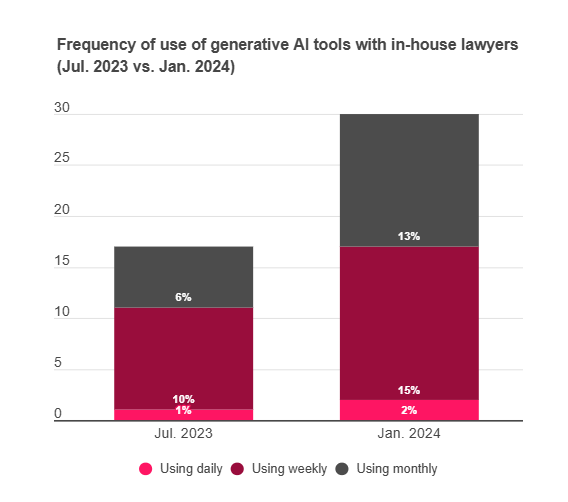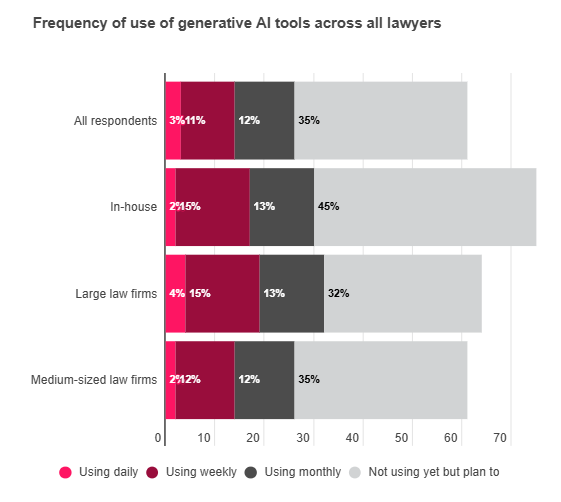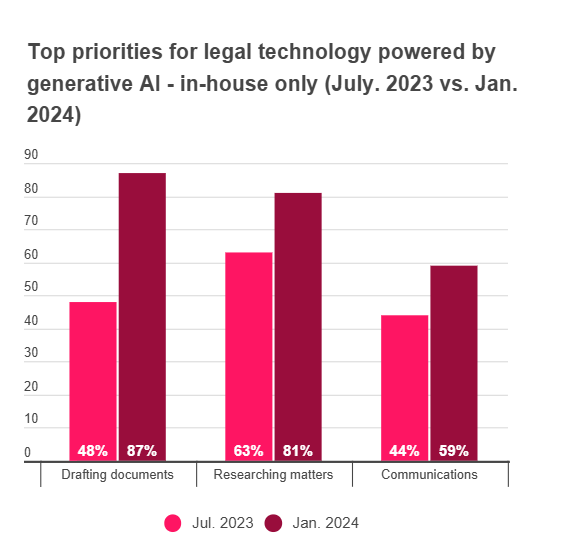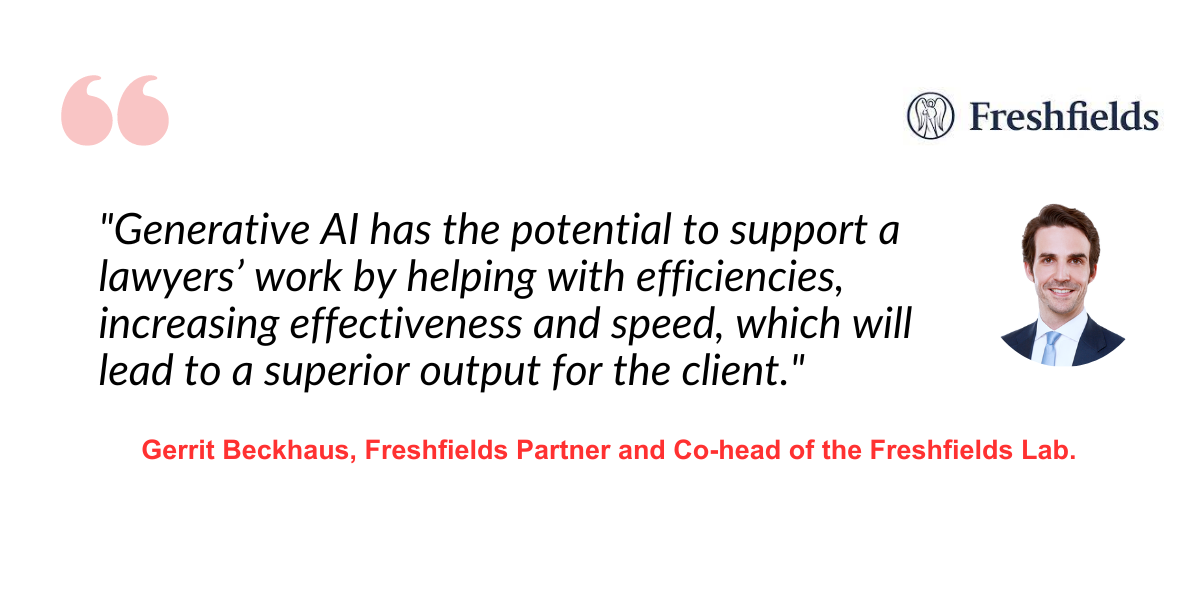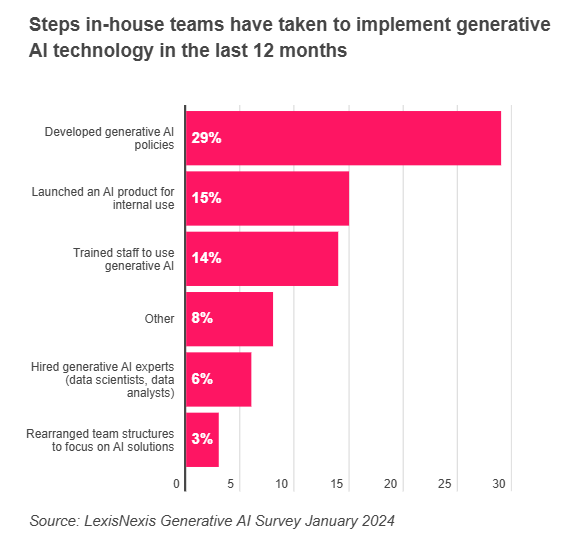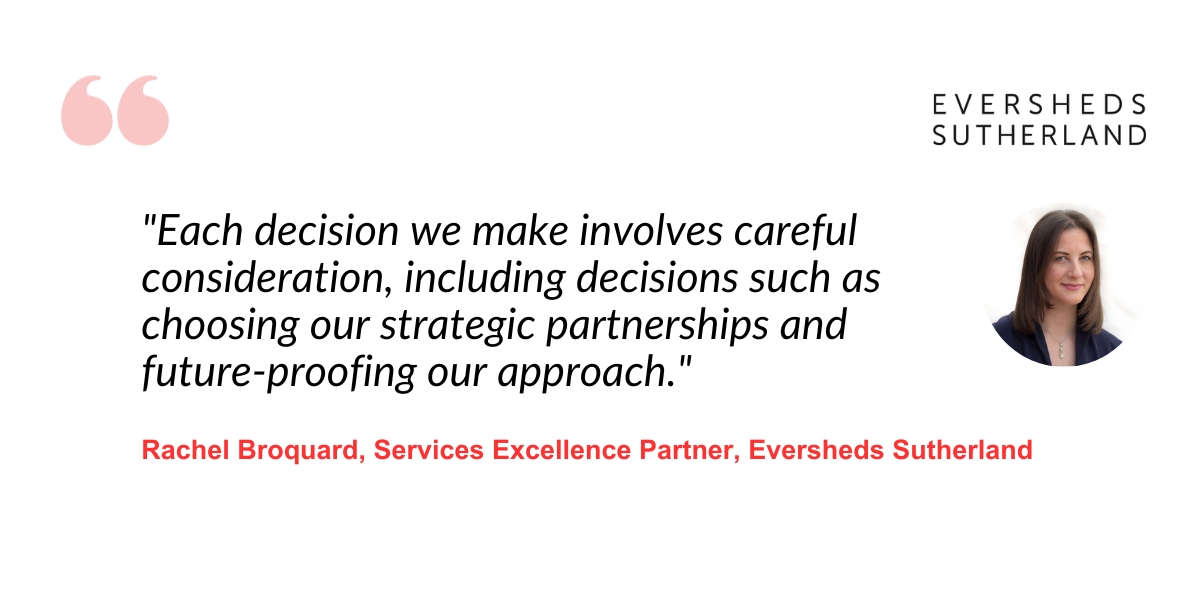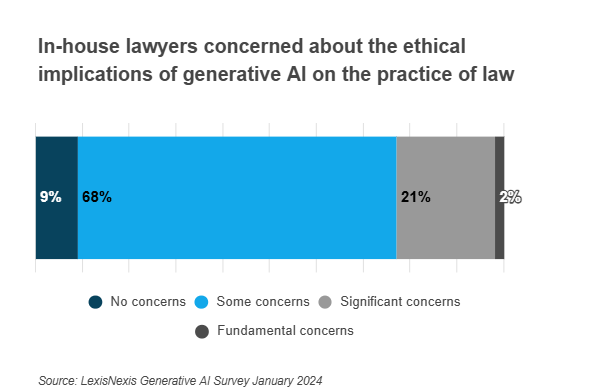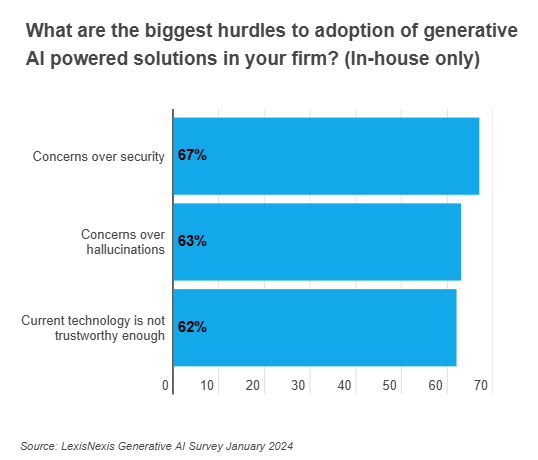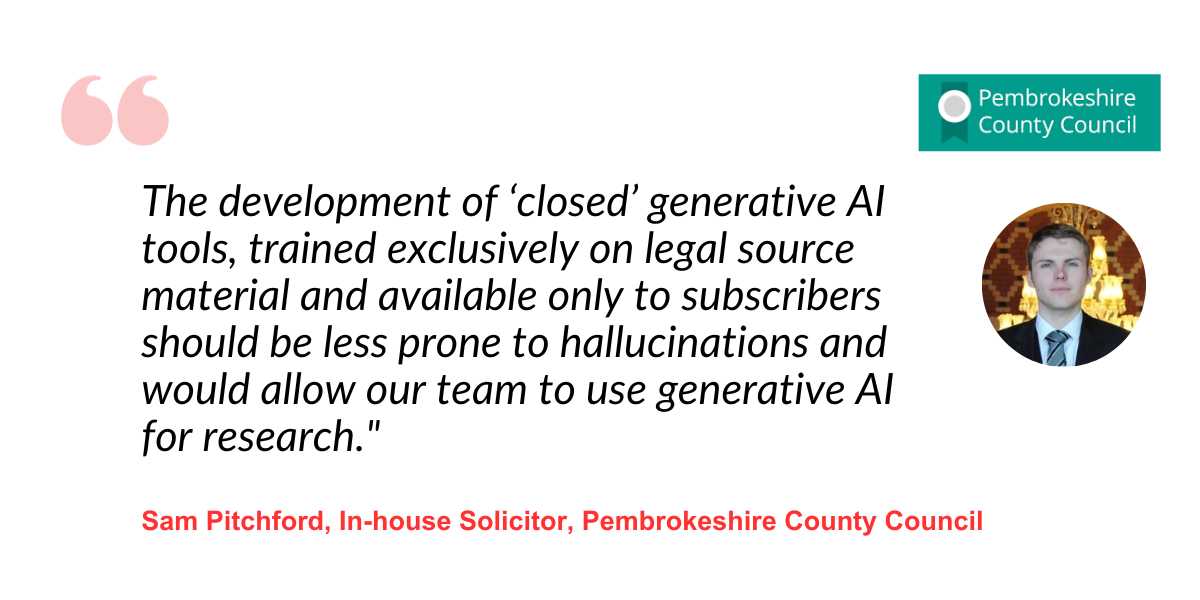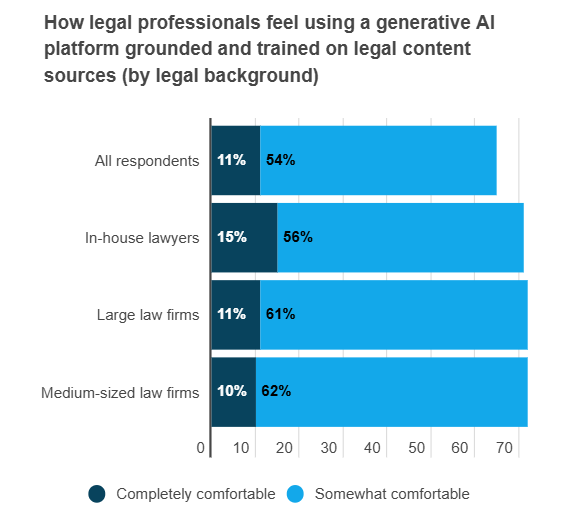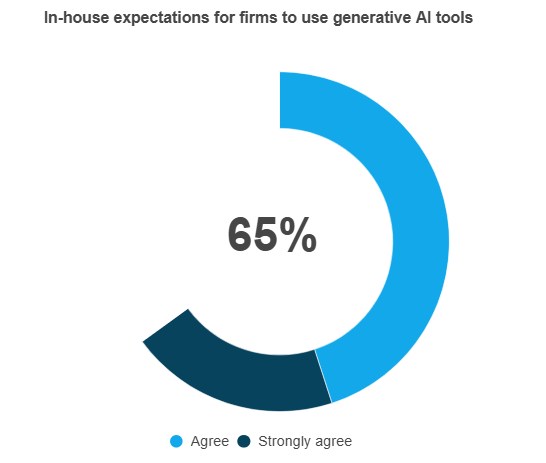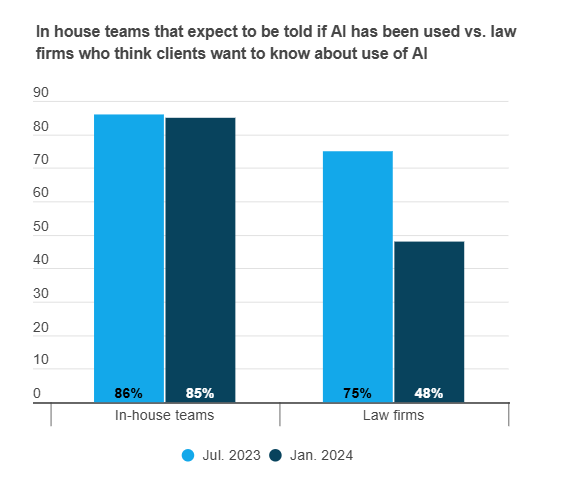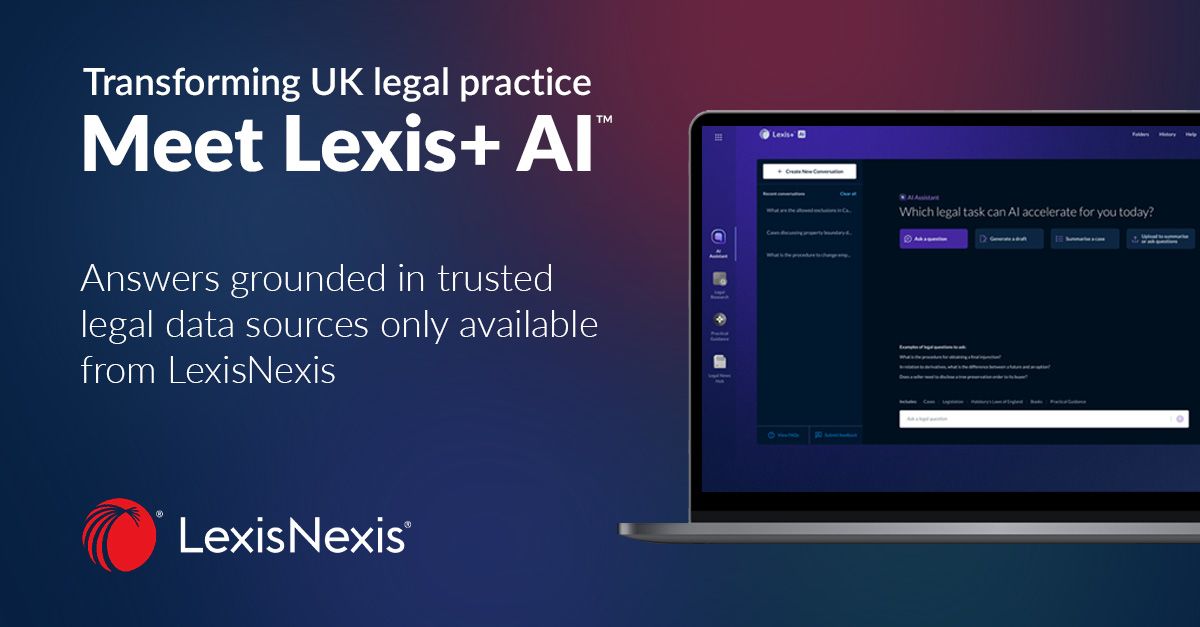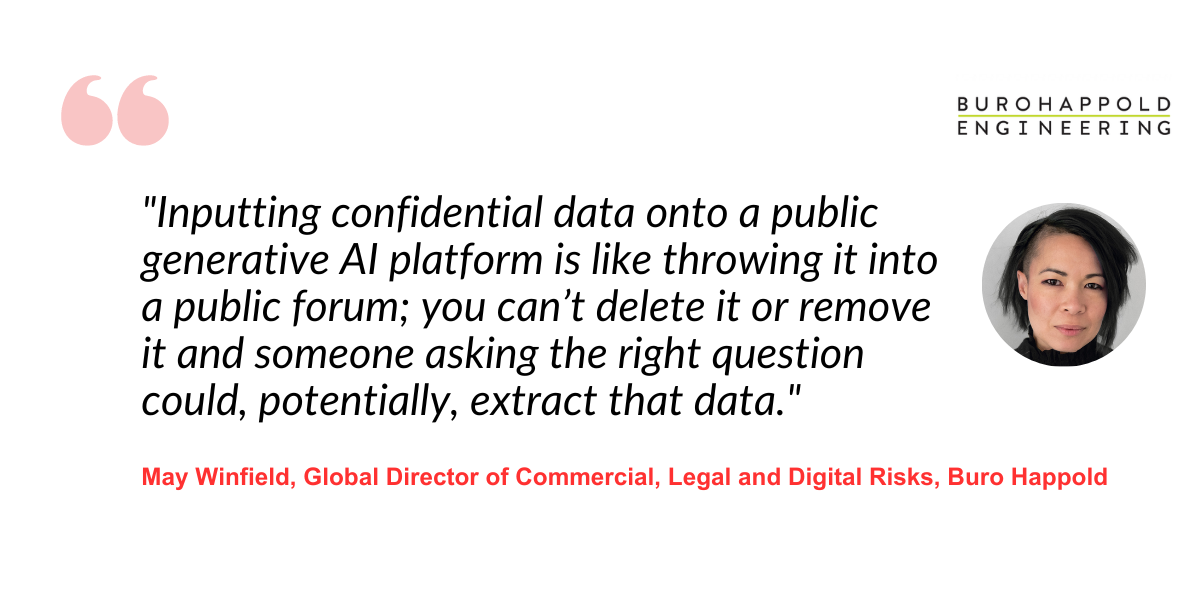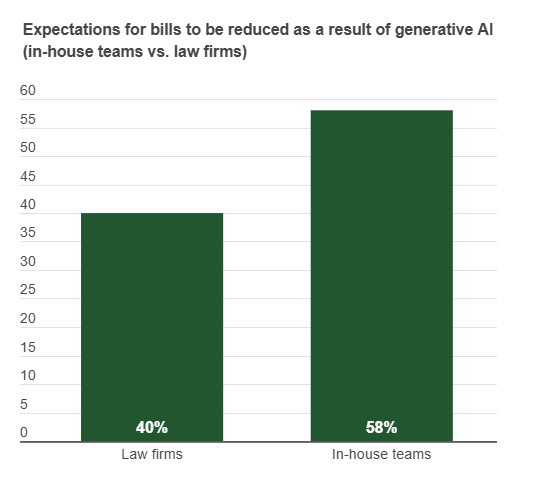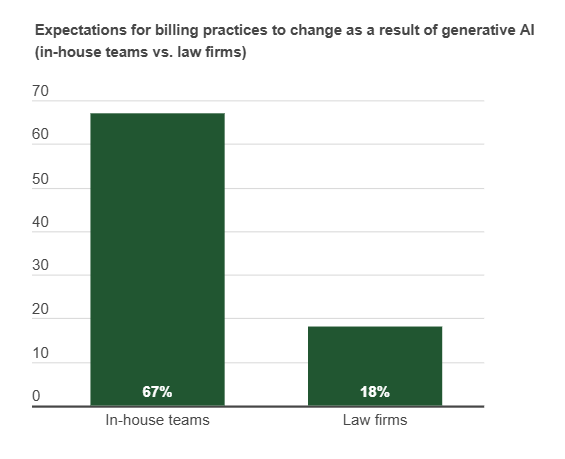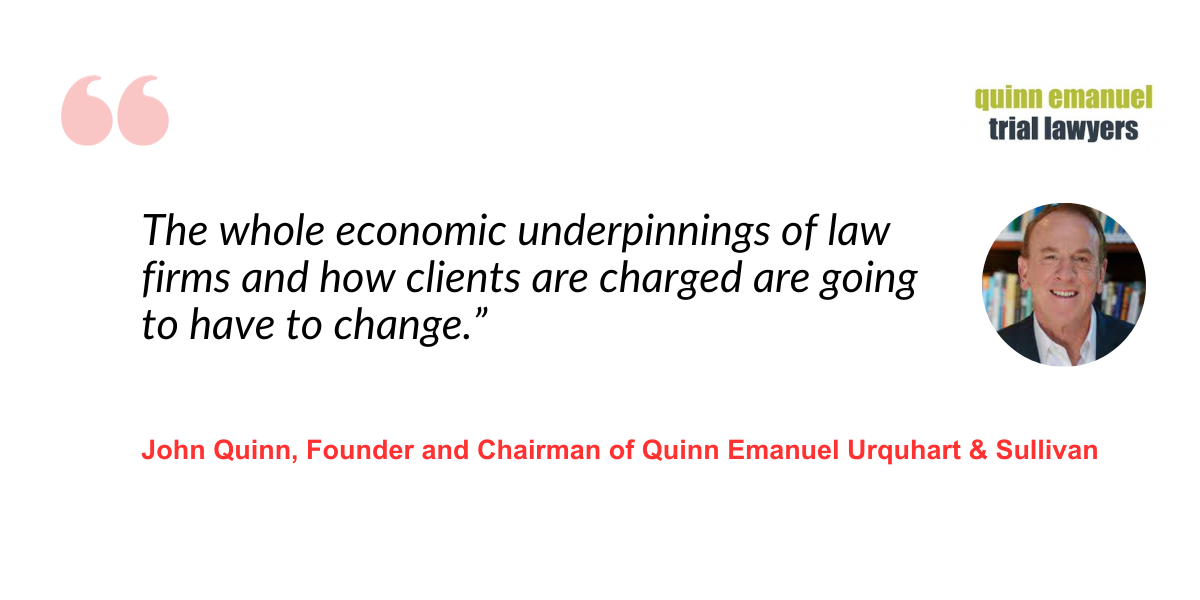In-house lawyers cross into the new era of generative AI
AI adoption rates accelerate. Yet, in-house legal counsel are demanding AI that is grounded in legal sources.

Corporate in-house lawyers throughout the UK have been quick to recognise generative AI for all its time- and cost- saving potential. In the last six months alone, the number of users has almost doubled.
Yet concerns still linger over the inaccuracies of public access generative AI tools. For corporate in-house lawyers to get the most of this rapidly growing technology, they want tools grounded in trustworthy legal sources.
In-house legal teams drive demand for generative AI
The latter half of 2023 saw generative AI transition from theory into practice. Innovative in-house legal teams moved at pace to incorporate generative AI into their internal processes.
Almost a third (30%) of the corporate in-house lawyers included in this survey revealed they're using generative AI tools at least once a month. This is a noticeable rise from 17% in July 2023.
We've also seen a noticeable increase in awareness of the many ways in which in-house lawyers can make use of generative AI technology. As such, almost half of in-house counsel (45%) have plans to use generative AI tools in the future.
While excitement levels are high, many in-house lawyers still harbour valid concerns over the ethical implications of generative AI. The technology has a tendency to fabricate answers, leak confidential data, and construct biases, posing an obvious challenge for the legal profession.
The majority of in-house teams are eager for generative AI tools that are grounded in legal sources, and can provide a higher-level of transparency for all responses generated.
Generative AI, as it currently stands, has the potential to save in-house counsel a huge amount of time and improve their effectiveness. In the months and years ahead, it will be interesting to see how the in-house legal function adopts and adapts to this new technology. Yet, one thing that is becoming increasingly clear is that generative AI is here to stay.
Stuart Greenhill
Senior Director Segment Management – LexisNexis

In-house lawyers gear up for generative AI
Almost a third of in-house legal professionals are now using generative AI tools at least once a month – and 45% plan to use it in the near future.

The appetite for generative AI technology in the legal sector is unprecedented, with lawyers from all backgrounds jumping at the chance to make the most of its time-saving potential.
In January 2024, LexisNexis surveyed more than 1,200 legal professionals in the UK on their use of generative AI - many of whom were from in-house legal roles within organisations. Almost a third (30%) of the corporate in-house lawyers included in this survey revealed they're using generative AI tools at least once a month. This is a noticeable rise from 17% in July 2023.
A large number of in-house lawyers also revealed plans to use generative AI tools in the future – 45% of respondents said this was the case (up from 28% in July 2023). The number of in-house lawyers with no plans to adopt generative AI dropped from 53% in July 2023 to 21% in January 2024.
While these AI adoption figures aren't staggeringly high, for the risk-averse legal profession, they represent a huge shift.
"Generative AI appears to be being embraced in a bigger and faster way than most other technologies in recent history," says May Winfield, Global Director of Commercial, Legal and Digital Risks at internationally renowned engineering advisory firm, Buro Happold.
"This area is developing all the time, and no one can afford to stand still and ignore it indefinitely."
Generative AI will fundamentally change the way we work in the legal industry, says Dr. Gerrit Beckhaus, Freshfields Partner and Co-head of the Freshfields Lab.
"Generative AI has the potential to support a lawyer's work by helping with efficiencies, increasing effectiveness and speed, which will lead to a superior output," he says.
Joe Cohen, the Director of Innovation at international firm, Charles Russell Speechlys, says using generative AI to help automate contract reviews, speed up drafting and summarise information is relatively safe, provided some level of human oversight is involved.
"As it currently stands, I would be uncomfortable with any real delegation to AI without human oversight, but am generally very optimistic about the gains we will see across the board in the legal sector in that context."
We also asked our in-house respondents how they plan to use generative AI in the immediate future. The biggest priorities were drafting legal documents at 87% (up from 48% in July 2023), and researching legal matters at 81% (up from 63% in July 2023). Relying on generative AI tools to draft emails or other communication-based tasks was also listed as a priority by 59% of respondents (up from 44% in July 2023). So, clearly in-house counsel are increasingly seeing and understanding how generative AI can help them do their work more effectively and efficiently.
Intellectual property solicitor, Gemma Cullis, who previously worked in-house in a number of FTSE 100 companies, views generative AI tools as a big step up from using template documents.
"Generative AI enables a layer of intelligent customisation which was formerly brought to the document by the lawyer."
While it isn’t a complete solution, it allows lawyers to focus on the genuine value-add, rather than the early stages of a draft, she says.
"Much as a fresh pair of eyes will frequently spot improvements that could be made to a document drafted by somebody else, an experienced lawyer will always want to hone and perfect an AI-generated document."
Rachita Maker, the Global Head of Legal Ops, Tech and Consulting at legal giant, DWF, believes generative AI will be a very reliable assistant for lawyers over the next few years.
"Generative AI can be used for legal research, such as preparing notes for arguments, or questions for depositions. It can also be used for regulatory compliance, highlighting regulatory changes and the potential impact it could have on an organisation's policies and processes."
The survey results also revealed a strong in-house demand to integrate generative AI with pre-existing platforms, such as contract analysis tools (77%) and contract lifecycle management (55%).
Winfield says in-house lawyers in particular will benefit from using generative AI for contract reviews.
"This won't replace the analysis and skillset of lawyers, but facilitate their reviews to be done faster and more consistently."
Almost half (47%) of corporate in-house lawyers said their organisation had made a change to their day-to-day operations as a result of generative AI. The most common changes included developing policies on the use of generative AI (29%), launching an AI-powered product for internal use (15%) and carrying out AI-related training for staff (14%).
New to artificial intelligence? Read LexisNexis' introduction to AI
To come up with new and exciting ways to use this rapidly-evolving technology, some are taking a collaborative approach. Rachel Broquard, Service Excellence Partner at Eversheds Sutherland (International), says her firm is using employee crowd-sourcing to put a series of new generative AI use cases to the test.
"We recently conducted a crowd-sourcing initiative, gathering over 150 use cases. From this extensive list, we distilled 30 key initiatives that are currently under review with the assistance of external consultants."
One notable development is the adoption of Microsoft Copilot, says Broquard.
"This protected and private generative AI tool empowers our people to generate content, analyse data and summarise documents more efficiently. Early feedback from our AI taskforce pilot group has been exceptionally positive."
Generative AI—is its output protectable by intellectual property rights?
When it comes to researching the right use cases for your organisation, Beckhaus cautioned the importance of understanding both the potential and limitations of each use case and effectively integrating it into relevant workflows.
"At Freshfields, we have been assessing the market in various jurisdictions around the globe for products as well as integrations of generative AI into the solutions of already established vendors."
Broquard also highlighted the importance of finding long-term partnerships that your organisation could rely on in the years ahead.
"Each decision we make involves careful consideration, including decisions such as choosing our strategic partnerships and future-proofing our approach."
LexisNexis has been using AI technologies such as natural language processing, machine learning, and deep learning in our products for many years. We have several search features that utilise GPT and we leverage other large language models where they are appropriate.
Sign up to the Lexis+ AI Insider Programme to get updates, early feature access and breaking news on the latest AI developments.
No. of in-house lawyers regularly using generative AI almost doubles in six months
Nearly half of in-house lawyers have plans to adopt
Legal drafting and research are the top priorities
Almost half of in-house teams have implemented an AI initiative
Building trust: the demand for accountable AI
Almost three-quarters of in-house lawyers would be more comfortable using generative AI tools grounded on legal sources.

While in-house lawyers are eager for the time-saving – and, potentially, cost-saving – benefits that come alongside generative AI, concerns still linger. And rightly so...
As any generative AI expert would admit, without specific training, oversight and grounding in appropriate content, the technology can fabricate answers based on inaccurate information. It can leak confidential data and construct biases.
Only 9% of respondents to our survey said they had no concerns using generative AI. Most respondents (68%) admitted they had some concerns, while just under a quarter revealed significant (21%) or fundamental concerns (2%). This is almost identical to findings from the July 2023 LexisNexis generative AI survey.
Mark Smith, Director of Strategic Markets at LexisNexis, says fears around accuracy of information are – and always will be – of vital importance to the legal profession.
"There's a huge fear of providing the wrong advice to clients, which is particularly heightened by issues with public access generative AI."
The biggest hurdles to adoption of generative AI are security concerns (67%), content hallucinations (63%), and the technology not being trustworthy enough (62%).
What are hallucinations?
Hallucinations are incorrect or misleading results that are generated using generative AI tools. These occur when there is insufficient training data, incorrect assumptions made by the model, or biases in the data used to train the model.
How to manage the risks of artificial intelligence in your business
According to Cohen at Charles Russell Speechlys, lawyers can mitigate hallucinations on public access AI tools by double-checking all outputs and verifying them from other sources.
"There are also certain use cases that are not recommended on public access tools. For example, asking AI to cite cases for you."
Beckhaus from Freshfields says hallucinations are intrinsic to generative Large Language Models (LLMs), which are trained to be creative and avoid repetition.
"There are technical ways to reduce the tendency of hallucinations by increasing the parameters to make generative AI more deterministic, such as lowering the temperature."
"In addition, prompting and context can further reduce the risk, alongside human guidance that can help to validate, assess and contextualise the results produced with the help of generative AI."
Cullis, who now works as a partner at law firm Aria Grace after more than a decade in-house, says she uses AI tools to get past that blank-page, where-to-start moment at the beginning of drafting from scratch.
"The trick is in asking the tool a good starting question, checking the result, asking a slightly different question, and repeating until you have the result you need."
In-house legal professionals were far more open to using generative AI tools that took accountability for the answers it produced.
Find a legal framework and regulatory guidance around explainability on Lexis+.
We asked respondents how confident they would be using a generative AI tool that was grounded on legal content sources, with hallucination-free, linked citations to the verifiable authority used to generate the response.
Almost three-quarters (71%) said they would be somewhat or completely confident using an AI-powered tool grounded on legal research and guidance content, such as Lexis+.
Samuel Pitchford, a solicitor for Pembrokeshire County Council in Wales, is excited to use generative AI for legal research purposes in the near future.
"We avoid using generative AI for research purposes at present to avoid hallucinations," says Pitchford. "But the development of ‘closed’ generative AI tools, trained exclusively on legal source material and available only to subscribers should be less prone to hallucinations and would allow our team to use generative AI for research."
Training materials—artificial intelligence (AI) in the workplace
In-house legal teams have, in many ways, been the pioneers of generative AI adoption in the legal profession. These time-poor teams have been looking to automate routine tasks for a long time now, and generative AI is the silver bullet. As a result, the number of in-house teams expecting their external counsel to use generative AI reached 70% in our July 2023 survey. In fact, almost half (49%) of in-house respondents expected their firms to adopt the technology within the next 12 months.
Read: Artificial intelligence—UK regulation and the National AI Strategy
Expectations for firms to use generative AI remains strong, with 65% of in-house counsel now expecting their firms to use AI.
The expectation that law firms inform clients when they're using generative AI is still high, at 85%, compared to 86% in July 2023.
"I suspect the number one reason is accuracy and fear of having the wrong advice, particularly heightened by issues with public access generative AI," says Smith from LexisNexis.
Interestingly, the latest survey found only 48% of firms believe their clients would want to know if or when they're using generative AI, down from 75% in the July 2023 survey. This highlights a potential point of friction for client-firm relations.
Besides inaccurate or unreliable information, another major risk of external firms using public access generative AI tools is potential data breaches, says Bunmi Tandoh, an in-house solicitor at London Borough of Enfield.
"Possible data protection breaches and breaches of confidentiality are a major risk," she says.
See guidance notes on data protection for artificial intelligence on Lexis+.
Winfield from Buro Happold says there is also the issue of confidentiality.
"Inputting confidential data onto a public access generative AI platform is like throwing it into a public forum; you can’t delete it or remove it and someone asking the right question could, potentially, extract that data."
While these risks are worrisome, some would argue that perhaps the biggest risk to lawyers is failing to make use of generative AI.
In January 2024, LexisNexis announced the commercial preview of Lexis+ AI in the UK, which searches, summarises, and drafts using LexisNexis content.
Grounded in the largest repository of accurate and exclusive legal content, Lexis+ AI combines the power of generative AI with proprietary LexisNexis search technology and authoritative content. Results are always backed by verifiable, citable authority or source.
In fact, a US survey of legal professionals using Lexis+AI revealed some very compelling time-saving benefits. Three-quarters (74%) of respondents estimated they would save up to 7 hours a week for legal research, and four-fifths (84%) anticipated saving up to 6 hours a week for legal drafting.
This tool was built with the RELX responsible AI principles in mind, says LexisNexis' Senior Director of Segments, Stuart Greenhill.
"Everything we do considers the real world impact of the solution, it proactively prevents the creation or reinforcement of bias, we ensure that we can always explain how and why our systems work in the way they do, human oversight is built in and that we respect and champion privacy and data governance."
Gerry Duffy, Managing Director of LexisNexis UK, says: “The Lexis+ AI solution is a proven first-of-its-kind tool for lawyers and will dramatically improve the speed, quality, and effectiveness of their practice and business. We have taken a customer-first approach to all our innovation, research and product development.”
LexisNexis has teamed up with leading law firms, such as Eversheds Sutherland (International), Macfarlanes, Pinsent Masons and CMS UK, as part of its commercial preview programme to tap into their expertise for advice and feedback.
How will AI impact pricing models?
In-house teams and firms are at odds when it comes to pricing expectations.

As legal teams come to terms with the opportunities and limitations of generative AI, one potentially problematic pitfall sits on the horizon – pricing. Some believe that the firms investing in generative AI-powered products or tools should be the ones who benefit from the time- and cost- savings. Others believe the benefits should be passed on to the client.
Our survey found 58% of respondents from in-house teams said they will expect bills to be reduced as a result of generative AI. Respondents from law firms, on the other hand, were less likely to agree, with 40% saying they expect bills to be reduced.
There was a stark contrast in opinion when it came to restructuring pricing as a result of AI. Two-thirds (67%) of in-house legal teams said they expect law firms to make changes to billing practices as a result of generative AI. However, only 18% of law firms said they will make changes to billing practices – despite 42% believing it will reduce overall costs for the firm and 30% believing it will increase hours billed.
"The whole economic underpinnings of law firms and how clients are charged are going to have to change," says John Quinn from litigation firm Quinn Emanuel Sullivan & Urquart.
Broquard from Eversheds says it's too early to predict the impact of generative AI on law firm pricing models.
"The legal sector is still in the early stages of understanding pricing trends in this evolving landscape."
Instead of focusing on pricing, Eversheds' priority is to invest in technology with tangible client benefits, she says.
"When evaluating technology investments, we collaborate closely with our strategic partners to assess proof of value, total cost of ownership and return on investment."
LexisNexis' Smith says there are deeper, more structural challenges organisations need to overcome before adopting and deploying AI solutions.
"Firms need to consider everything from their pricing and resourcing models, to the investment costs for acquiring, developing or training generative AI solutions, to employee concerns around job security and satisfaction."
Smith says properly trained and grounded generative AI can ultimately underpin certain legal tasks being undertaken faster and at higher quality than that done by a human alone.
"The impact of this on price will depend on many different factors – the importance and number of those tasks in the overall workflow, the pricing mechanism at play, the commercial relationship between the client and law firm, and the overall level of competition in that segment of the market."
In-house legal teams have a lot to consider over the months ahead – and pricing will be one of them. Yet the opportunity for lawyers of all backgrounds to improve their reach and break new ground is high. As a result, we are seeing real collaboration between law firms and their clients, between technology and innovation teams and fee-earners, between junior and senior legal professionals. And no-one is talking about pricing.
Final thoughts
The time-saving benefits of generative AI are just the tip of the iceberg. Look deeper and you'll see a never-ending list of ways in-house lawyers can use generative AI technology.
For a centuries-old profession, the level of excitement we're seeing for generative AI in the legal community is completely unprecedented.
Lawyers are eager to streamline legal research and document drafting, and to integrate the technology with their internal systems. But there's also an eagerness to find ways to add even more value to clients or stakeholders.
However, many are still cautious about the risks that come alongside this increasingly popular technology – and rightly so.
A welcome solution to this challenge will be generative AI tools that are grounded in reliable legal sources. This will enable lawyers to carry out a range of tasks with confidence.

Survey methodology
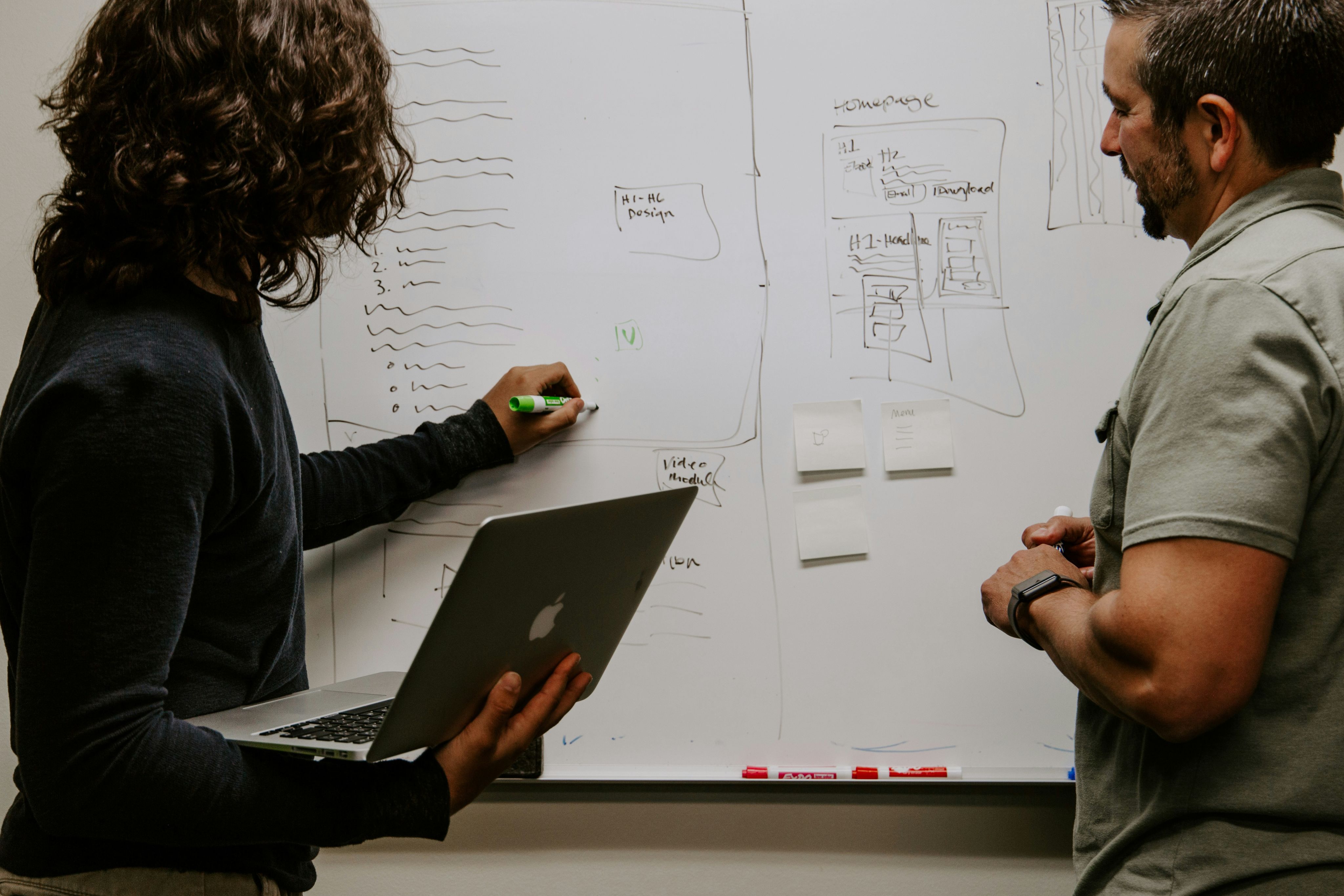
The survey was conducted across 1,225 lawyers and legal support workers in the United Kingdom from 03 January to 19 January, 2024. Surveys were conducted in English.
